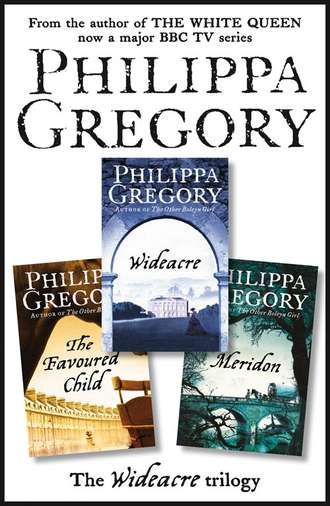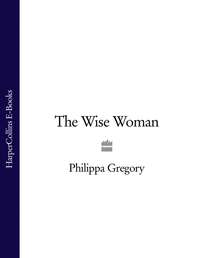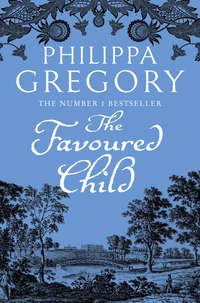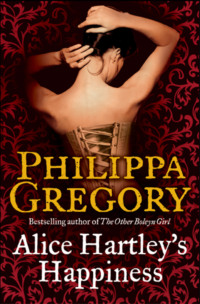
Полная версия
The Complete Wideacre Trilogy: Wideacre, The Favoured Child, Meridon
‘Is that all?’ I asked.
‘Well, I should think it was enough!’ he said with the gossip’s relish for bad news. ‘But there is more actually. Although they left their furniture, they took an old handcart. Old Betty swears she saw someone who looked like Meg pushing the handcart with a body in it and two black dogs following up the London road three mornings ago. She never said anything before because she thought she was mistaken. But with the handcart missing and all, the village has put two and two together.’
I nodded and kept my eyes and face down so my brother should not see my despair and my fear. It had all gone wrong. It sounded very, very likely that Meg had managed to save Ralph’s life, though he was too weak to walk. Ralph must have been able to tell her who set the trap, and who had baited it. If he had not told her, she would have instantly brought him to the Hall. But she did not! She had taken him away, far away from the Hall and out of my reach; away to her people, to her untamed gypsy tribe. Away to heal him so that he could get fit and strong and able to come back and confront me. Away from our lands and our influence, so he could move and plot and scheme and forever threaten my life and my future. Every waking moment from now on I would half expect to see him as I already did in every night’s dreams. Limping, or horribly mutilated, coming after me for revenge. The picture in my mind was so bright, so vivid, so inescapable, that it seemed to me Ralph was at that second heaving his legless body up the steps to the door of the Hall. I could control myself no longer.
‘I am ill, Harry. Call my maid,’ I said, and I dropped my head on the breakfast table in a swoon of terror.
My mourning now looked real enough and I smiled no more at my mirror. I could not eat my food for fear that Ralph had been in the kitchen with one of Meg’s gypsy brews to poison me. I dared not even walk as far as the rose garden in case he was waiting for me in the summerhouse, or at the gate to the wood. Even in the house I was on the precipice of a collapse every second of the day, but especially when the early winter darkness came and the curtains were drawn, and there were dark shadows on the stairs and in the hall where he could hide unseen, and wait for me to pass. I slept little at night and awoke with screams of terror. My mother called the local apothecary and then a London surgeon and they gave me draughts to make me sleep. But the deeper the sleep, the worse the dreams, and for three, nearly four, months of cold, hard, iron season I endured, like a captured wild animal, inescapable days and nights of terror.
But slowly, mercifully, it dawned on my panic-stricken imagination that nothing had happened. In my terror, in my anticipation of fear, I had missed that saving point: nothing had happened. No one knew that my father had been torn from his horse and clubbed like a dying rabbit. No one knew that the blood from Ralph’s sweet, hard thighs had poured into our dark earth in a trap baited with betrayal. Those two events had happened at the freezing of the year, and since then everything had iced up. All through the dark winter months everything, except my dashing brain and thudding heart, had been still.
The winter softened and one morning I woke, not to the song of the one solitary robin, but to a burble of birdsong and to the distant sound of the ice on the Fenny giving way to a rush of melt-water. I threw a thick shawl on over my dark woollen dress and walked in the garden. The pane of glass that had been between me and the land seemed to be dissolving like the ice in the chalk of the frozen downs. Everywhere I looked there were little green shoots, brave slight spikes pressing through the earth. And no Ralph. Thank God, no Ralph.
When I looked towards the wood where his home had been all I could see was the innocent haze of the first buds of leaves which made a halo of green around every black-branched tree. The wood was not blighted by his blood or by my treacherous death-kiss. Our love and his blood had been absorbed into the earth – the good neutral earth – as easily as the death of a rabbit or the spitting of a snake. The land had not hardened for ever into a season of revenge; it was growing moist and warm and full of the promise of spring like any other year. And whoever won the land, and whatever sins they crawled through to claim it for their own, the snowdrops would still flower in an icy carpet under the bare trees where the sap was secretly rising.
Whatever had happened had happened in the past. And it had happened in autumn when it is natural for things to die and blood to be spilled. Autumn is a time of challenge and killing; winter a time of rest and recovery, and spring means new plans, new movement and new life.
I walked faster, down to the end of the rose garden, with my old swinging stride. I went through the gate where the new lichen was growing, wet and smeary to the touch, into the wood and under the dripping trees without a second thought. I put one hand on the damp bark and felt the thudding heartbeat of my beloved Wideacre in the sweet urgency of the new season. The spring had come with the speed of a damp wind blowing, and the wet earth was warming to a new, a yellow, sun. I sniffed the wind like a pointing dog and smelled the promise of more rain, the scent of the growing earth, and even the tang of the salt sea from southerly over the downs. And I had a sudden real, glad delight in the fact that although Papa and Ralph might be dead, I had survived, and my body was stronger and more curved and lovelier than ever. I came home humming a tune and realized that for the first time in months I was sharply hungry for dinner.
Harry cantered up the drive and waved to me. I strolled through the rose garden and noticed the weeds growing through the gravel. I should speak to Riley. Harry dismounted and waited for me at the gate and I realized with an inner smile as I glanced at his strong, lithe body – broadened and stronger with his riding and maturity – that there was even a little flicker of desire somewhere deep inside me. I was alive, I was young, and I could once more see myself as lovely – the Wideacre goddess renewed by the spring, leaping up from the deaths of old pains and old sorrows.
So I smiled sweetly at my brother, and put my fingertips lightly on his arm and let him lead me into the hallway of our house.
It was a measure of my recovery that Harry raised the question of Ralph again, and I did not flinch at the mention of his name. We had stayed up late to finish reading a novel together, which Mama had declared too silly to cost her sleep. But I had begged Harry to read to the end. We were alone in Mama’s parlour in front of the dying embers of the log fire.
‘I suppose we need a new gamekeeper’s lad,’ Harry said tentatively, watching my reaction.
‘Good heavens, haven’t you found one yet!’ I exclaimed, naturally horrified. ‘Bellings can’t do it all, and if you don’t get someone young and fit the villagers will be all over the coverts. You won’t hope to hunt this autumn unless you stop them shooting foxes now. As for venison, you must get another keeper for the young deer, Harry, or there will be no sport and no meat.’
‘No hunting anyway,’ he reminded me. ‘We’ll still be in mourning at the start of the season. But I’ll get a young keeper. I miss Ralph rather.’ His eyes were bright with curiosity, and something deeper, some anxiety. ‘He was very able, very agreeable. He helped me with the estate.’ He paused. I understood in a flash what Harry wanted to know. ‘I quite liked him,’ he said, denying with an easy lie his infatuation with Ralph. ‘I think you did too?’
The incongruous picture of Ralph and me naked while Harry crawled towards us, his face in the dusty straw, laying his cheek against Ralph’s bare foot, flashed into my mind, but I still said nothing until I was certain what Harry was thinking.
‘He had a very strong, not to say forceful, personality,’ Harry continued, picking his words with care. I took my cue and raised my tear-filled eyes to his open and anxious young face.
‘Oh, Harry,’ I said, my voice breaking on a sob. ‘He made me do such dreadful things. I was so afraid of him. He said he would lie in wait for me and tell, oh, such dreadful lies about me if I didn’t obey him. He terrified me and if you hadn’t come in that one time, I don’t know what would have happened.’
‘I … saved you?’ asked Harry hopefully.
‘He would have dishonoured me and our family name,’ I said firmly. ‘Thank God you came in time, and since that day he was too afraid of you to pursue me any more.’
The truth of the scene was fading from Harry’s malleable mind to be replaced with a rosier picture of his heroic rescue of his virtuous sister.
‘My dearest sister,’ he said tenderly. ‘I have been so worried, but I scarcely liked to ask … He did not complete his dreadful act? I came in time?’
My cheeks flushed pink with maidenly embarrassment, but my sincerity and honesty gave me courage to speak.
‘I am a virgin, Harry,’ I said demurely. ‘You saved me. And the man who threatened me has gone for ever; exiled, no doubt, by the hand of God. My honour is yours.’
Darling Harry, such a growing, broadening man, yet such a baby. And so like Mama in his preference for the easy lie rather than dreadful truths. My smile to him was warm and convincing while the outrageous lies went on.
‘You saved my most precious honour, Harry, and I will never forget that I am under your protection. You are the head of the house now, and the head of the family. I am proud and confident to put myself in your care.’
He stretched out his hand to me and I moved into a chaste and affectionate embrace. A flicker of desire again stirred in me as I felt a man’s arms around me, and half consciously I could feel the muscles in my legs and buttocks tense as Harry’s hands gently spanned my waist. Some tiny demon of childlike mischief made me turn in his fraternal hold so one hand slid accidentally up the smooth warm silk to the swelling curve of my breast.
‘Unreservedly,’ I said.
He left his hand where it chanced to lie.


That night my mind played a strange trick on me in my dreams. I dreamed of Ralph, not the Ralph of my nightmares but the old Ralph of our loving summer. I was drifting through the rose garden, my feet skimming over the gravel paths. The gate opened before me and I made the same ghostly progress down to the river. By the bank stood a figure. I knew it was my lover and we slid together. His body entered mine with piercing sweetness and I moaned with pleasure. The high note of pleasure and pain disturbed my sleep and I awoke, full of regret. The dream faded fast as I opened my eyes, but the face of my lover as he lifted his head from our deep kiss was Harry’s.
I suppose I should have been shocked, but instead I merely smiled and sat up in bed. To dream of Harry while the spring was stirring seemed natural and right. We were constantly in each other’s company and I gained more and more pleasure from our comradeship. It was pleasant to walk in the gardens with him. We were planning a shrubbery, and we would take a stake and map out the shape of the paths on the newly turned earth. Then, when the carter came loaded high with swaying trees and shrubs, we spent a glorious couple of days ordering their planting by the three gardeners, and even treading them in, tying and staking out the branches ourselves.
Sometimes we drove up to the downs together. Although I was still forbidden to ride outside the grounds, I had hunted out an old governess cart and broke my mare to driving so I could range all around the estate and drive as far as the foothills of the downs with Harry riding alongside. I thought sometimes how pleased Papa would have been to see us in such unity on the land he loved.
‘Are you not tired, Beatrice?’ Harry would ask solicitously.
And I would smile without replying and we would stroll together to the top of the downs to look down on the surrounding greening fields and woods; or turn our backs and look southwards to where the sea gleamed like a blue slab in the distance.
I started to lose my fear of Harry’s superior education, especially when I saw how little he still knew about the land. And I started to enjoy hearing about his books and the ideas that interested him. I could never see what actual difference it made whether one had an agreement called a Social Contract or not, but when Harry spoke of the struggle for the ownership of land, and whether land could be owned by an élite of a people, I found my interest suddenly sharpened.
He would laugh at me then and say, ‘Oh, Beatrice, you care for nothing at all unless it relates to Wideacre. What a little heathen you are! What a little peasant!’
And I would laugh back and accuse him of being so full of ideas that he could not recognize wild oats in a wheat crop – which was shockingly true.
If there had been more young people in the neighbourhood we would have spent far less time together. Or if Harry had known more about the land he would not have needed my company daily. If we had not been in heavy mourning, Harry would probably have spent the previous winter in London for the season, and even I might have been taken to town for a few days. But as things were, we were very much on our own. My returning spirits showed themselves in my better health and I became once more buoyantly fit, restrained only by Mama who tried to keep me eternally stitching embroidery by her side in the pale parlour. There was no Papa to come banging in from the stables and rescue me from the tyranny of conventional behaviour now, but I could generally rely on Harry to need my advice for some work on the land.
The land missed Papa. Harry was inexperienced and slow to learn how to control the tenants who poached and thieved outrageously. Nor could he organize the villagers’ sowing and weeding of our crops. But beside his ignorance my status grew, and it was very pleasant to be able to order this thing or that thing to be done without confirming an order with the Master. I kept thinking how good it would have been if I could have had the land wholly to myself, but it was only ever a passing thought. It was also good to drive down the lanes to the fields with Harry riding alongside, and to look up in the evening and find his eyes smiling upon me.
He was no longer the schoolboy home early. He was a man in the first broadening and strengthening of his youth. As for me, every day made me a shade more golden, my eyes brighter hazel, my hair a tinge redder from the sun. Every day as I bloomed in the warmth of that especially fine spring, I felt a greater longing for a lover. I pressed my lips together remembering Ralph’s rough biting kisses, and my body warmed and tingled under the black silk of my mourning dress when I remembered his intimate, shameless probing. Harry once caught my eye in one of these erotic daydreams as we sat alone beside the library fire one evening, supposedly doing accounts. I blushed at once to the roots of my hair.
Harry, oddly, said nothing, but he looked at me as if he were somehow bemused and blushed too.
We were so delightfully strange to each other. My pleasure with Ralph had been in confirming the person I was, the things that were important. With Ralph I hardly needed to speak. We both knew if the day would be fair or if it would rain. We both knew that the villagers would be planting the fields on the bottom slopes of the downs so we would have to hide in the woods that day. We both knew that passion and the land are the most important things in anyone’s life, and that any other interests are secondary and slight.
But Harry knew none of these things, and while I could not help despising his ignorance, I felt also a great curiosity about the things he did know, and the things he did care for. Harry was a great intriguing mystery to me, and as the warm spring days became reassuringly hot summer ones I found my interest in him growing and growing while the corn turned silver-green. The only distraction from this growing affection and intimacy was Mama, who would intermittently insist that I behave as a normal young lady and not as a farm manager. But even she could not ignore Harry’s real need for me on the land. One day when she insisted that I stay at home to receive a call from the ladies from Havering Hall, we lost something like fifty pounds on one day’s work! Harry could not control the reaping gang and their families following behind to glean robbed us of one stook in every three.
The ladies – Lady Havering and little mousey Celia – had chatted politely with Mama as I watched the sun stream through the window, and knew in impotent rage that Harry would not be watching the reapers. When he came in for afternoon tea my fears were confirmed. He reported with great pride that they had finished the Manor Farm fields already. Properly cut they should not have been finished until the following day. Harry sat beside Celia Havering and nibbled seed cake like a sun-kissed cupid without a care in the world, while I could hardly sit still for anxiety.
He chatted away like a caged songbird to Celia, who actually spoke back in a voice a fraction clearer than her habitual whisper. Half an hour he spent talking of the lovely weather and the latest novel, before a hard look from me reminded him that he had workers in the field who were, I knew, taking an equally lengthy break. He took himself off with much flowery bowing and kissing of hands and seemed almost sorry to leave. The mysterious tastes of my beautiful brother were not always a delight.
‘You seem very anxious about the harvest, Miss Lacey,’ said Celia softly. I looked sharply at her to see if she was being impertinent, but the soft brown eyes were guileless and her face pale and quite without a spark of malice.
‘It is the first harvest Harry has had to supervise,’ I replied absent-mindedly. ‘He had been away from home and does not know our country ways. I am afraid I am needed out in the fields.’
‘If you would like –’ she paused delicately. ‘If you would enjoy a drive –’ She broke off again. ‘We came in Mama’s carriage and you and I could … I am sure …’ Her flutter of words came to a total standstill but her meaning finally penetrated my ears. I had been watching some rain clouds on the horizon that would have ruined everything if they had come to anything, but they seemed to be breaking up.
‘A drive?’ I said. ‘I should love it!’
‘Mama’s carriage’ turned out to be a large old-fashioned open landau, and after much fussing with parasols to protect our delicate complexions, we drove towards the fields. Celia tilted her sunshade precisely at the sky to cast a shadow over her face. She was milk compared with honey sitting beside me. Her skin looked as if she had been reared in a cellar she was so beautifully pale, while I was a clear honey colour on face, hands and throat, and had even a disastrous dusting of freckles on my nose. Even in my dark mourning clothes I was bright beside Celia, with flushed cheeks from the warmth of my heavy dress in the sun. She was pale and cool, her shy brown eyes scarcely daring to look over the hedges as we drove. She had a little trembly face and a quivering rosebud mouth. She seemed so young beside me. Five years older but such a sweet baby.
She showed no signs of anxiety at the plight of being ill-loved and unmarried at twenty-one. Her pale prettiness had not taken in London during her one cut-price season. Lord Havering had opened Havering House for her coming-out ball and had stood her the price of a court gown. But all of Lady Havering’s fortune at marriage had been squandered on betting and gambling, and there was little to spare for her daughter. Celia’s own substantial fortune, secure from her step-papa by sensible settlements, had guaranteed her one or two proposals. But Celia had demurred, and Lady Havering had not insisted, and she had come home to her restricted and hard-working life at the Hall with little idea that life for a young girl could include pleasure, or liveliness or joy.
She had little enough joy in her life. When her mama accepted Lord Havering and moved into the Hall little Celia went too, more like an extra bandbox than a person whose wants might be consulted. Aged eleven, she had been put in charge of the jolly, noisy Havering children for day after long crowded day, while Lord Havering recouped his gambling debts by dismissing housekeeper, governess and nurse, leaving his new wife and stepdaughter to share the work of running house and nursery between them.
The nobly born, ill-bred Havering children cared not a rap for their quiet-voiced, subdued new sister, and Celia, in silent mourning for her papa and their quiet, invalid’s routine, lived a life of loneliness and solitude in the very heart of one of the biggest houses in the county.
Enough in that situation to make any girl nervous. Celia was fortunate only in that her dowry, which was a handsome parcel of land adjoining ours, a good half-dozen farms tied up by her mother’s lawyers, was safe from her spendthrift stepfather as part of the marriage settlement. I knew her from childhood when our mamas would call on each other and I would be taken to the nursery to romp with the small Haverings and attend Celia’s solemn dolls’ tea parties. But when I grew old enough to ride with my father, I saw little of her. We sometimes took our hounds over to Havering Hall, and I would wave to her as I rode beside my father in my smart dark green or navy riding habit, and see her watching, a fragile flower in white satin, from an upstairs window. She never rode, of course; she never even came to greet us from the front door. I think the major expeditions in her week were the two church services on a Sunday, and the occasional social visit like this one. What can have prompted the idea of a drive, the Lord only knew. I would have driven with the devil himself to see the fields; what Celia hoped to gain I neither knew nor cared.
As soon as we came in sight of the field I saw that I had been right. A dozen men were cutting in the line with their wives and children coming behind to collect the corn and set it in stooks. By rights, when the corn had been cut, the women and children and the men could then glean, picking up the broken straw for bedding or fodder for their animals, and picking up the dropped heads of corn for themselves. Harry had been letting them cut so carelessly that whole patches of the crop would be left standing for the convenience of the gleaners, and they were trying the old cheat of slicing the corn so short it would not bind into a stook and would be dropped for the families to collect.
Instead of supervising this shambles, Harry was stripped down to shirtsleeves himself and playing around with a sickle at the end of the line. Even in my temper I could not ignore his dazzling looks. Wig off, his own hair shone like pure gold in the bright sunshine and his loose white shirt billowed around him. He was taller than the men around him and slim. His dark breeches were cut close to his strong legs and back. I swear a saint would have felt desire on seeing him. Celia’s eyes, like mine, were glued to him, and he glanced up and saw her and waved and came to the gate.
‘It’s to be hoped you don’t cut your feet off,’ I said acidly. I was hot and irritable draped in my heavy black mourning clothes. Celia beside me was the picture of cool perfection in white silk under a cherry parasol.
Harry laughed in delight. ‘I dare say I will!’ he said happily. ‘It’s splendid fun! When I think of all the harvests I’ve missed! Do you know this is my first-ever harvest at Wideacre?’
Celia widened her brown eyes sympathetically. She could not drag her gaze from him. His open shirt revealed the glint of a few hairs at the top of his chest, and his skin was as pale as creamy milk with a pink tinge where he was catching the sun.
‘They should be closer together,’ I said. ‘They’re missing more than a yard every time they move forward.’










